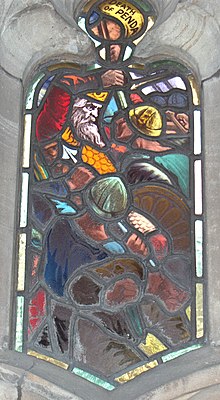King Penda of Mercia
| Penda | |
|---|---|

Stained glass window, depicting Penda's death at the Battle of the Winwaed, Worcester Cathedral
|
|
| King of Mercia | |
| Reign | c.626 – 655 AD |
| Predecessor | Cearl |
| Successor | Peada |
| Born | c.606 |
| Died | 15 November 655 AD Possibly the Cock Beck in present-day Yorkshire at the Battle of the Winwaed |
| Spouse | Cynewise |
| Issue |
Peada Wulfhere Æthelred Merewalh Cyneburh Cyneswith |
| Dynasty | Iclingas |
| Father | Pybba |
| Religion | Pagan |
Penda (died 15 November 655) was a 7th-century King of Mercia, the Anglo-Saxon kingdom in what is today the English Midlands. A pagan at a time when Christianity was taking hold in many of the Anglo-Saxon kingdoms, Penda took over the Severn Valley in 628 following the Battle of Cirencester before participating in the defeat of the powerful Northumbrian king Edwin at the Battle of Hatfield Chase in 633.
Nine years later, he defeated and killed Edwin's eventual successor, Oswald, at the Battle of Maserfield; from this point he was probably the most powerful of the Anglo-Saxon rulers of the time, laying the foundations for the Mercian supremacy over the Anglo-Saxon Heptarchy. He repeatedly defeated the East Angles and drove Cenwalh the king of Wessex into exile for three years. He continued to wage war against the Bernicians of Northumbria. Thirteen years after Maserfield, he suffered a crushing defeat by Oswald's successor and brother Oswiu, and was killed at the Battle of the Winwaed in the course of a final campaign against the Bernicians.
The etymology of the name Penda is unknown. Penda of Mercia is the only monarch with this name, but a number of Mercian commoners with the same name are on record.
...
Wikipedia
